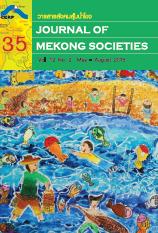Translocality: Myanmar Migrant Workers’ Religious Space-making in Ranong Province, Thailand
Main Article Content
Abstract
This article examines the relationship between Myanmar migrant workers’ religious space-making and its local host community in Ranong, a province in southern Thailand on the Thai-Myanmar border. This study found that before the influx of the migrants, ‘Burmeseness’2 was not foreign to the local society, but has been gradually transformed into an object of alienation by Thai state policies. In recent years, the migrant workers’ establishment of ties to the local community through religion - a symbolic space - has created an imaginary home for migrants, which is linked to the place of residence. Such linkages of multi-ethnic and multi-local consciousness among diverse groups of people across local and nation-state boundaries may be called ‘the conjunction of (trans) localities’ are transforming relationships among coexisting migrants and local people. The religious sphere has served as a cultural mediating agent between these diverse groups, reflecting hybridity and complexity of how localization and globalization are manifested in the borderland.

